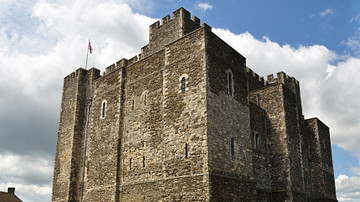Search Definitions
Browse Content (p. 177)

Definition
Colosseum - Rome's Great Flavian Amphitheatre
The Colosseum or Flavian Amphitheatre is a large ellipsoid arena built in the first century CE by the Flavian Roman emperors of Vespasian (69-79 CE), Titus (79-81 CE) and Domitian (81-96 CE). The massive arena held 50,000 spectators and hosted...

Definition
Seven Against Thebes
Seven Against Thebes is the third part of a trilogy written by one of the greatest of the Greek tragedians, Aeschylus in 467 BCE, winning first prize in competition at Dionysia. Unfortunately, only fragments of the first two plays, Laius...

Definition
Order of the Garter
The Most Noble Order of the Garter is the highest order of knighthood in Britain and the most exclusive with traditionally only 24 knights as full members at any one time, along with the reigning monarch and the Prince of Wales. Created by...

Definition
Medieval Heraldry
Heraldry, which is the use of inherited coats of arms and other symbols to show personal identity and family lineage, began on the mid-12th century CE battlefield as an easy means to identify medieval royalty and princes who were otherwise...

Definition
Cambyses II
Cambyses II (r. 530-522 BCE) was the second king of the Achaemenid Empire. The Greek historian Herodotus portrays Cambyses as a mad king who committed many acts of sacrilege during his stay in Egypt, including the slaying of the sacred Apis...

Definition
Motte and Bailey Castle
The motte and bailey castle was an early form of medieval fortification especially popular with the Normans in northern France and Britain during the 11th century CE. A single tower was built on (or partially within) the motte or earth mound...

Definition
Medieval Castle
Medieval castles were built from the 11th century CE for rulers to demonstrate their wealth and power to the local populace, to provide a place of defence and safe retreat in the case of attack, defend strategically important sites like river...

Definition
Yin and Yang
The principle of Yin and Yang from Chinese philosophy is that all things exist as inseparable and contradictory opposites. Examples of Yin-Yang opposite forces are female-male, dark-light, and old-young. The pairs of equal opposites both...

Definition
Dover Castle
Dover Castle, located in the southern county of Kent, is one of the largest castles in England and one of the first to have concentric defensive walls. First built in 1066 CE by William the Conqueror to help prevent anyone repeating his own...

Definition
Circus Maximus
The Circus Maximus was a chariot racetrack in Rome constructed in the 6th century BCE. Used for other events such as the Roman Games and gladiator fights, it last hosted chariot races in the 6th century. Partially excavated in the 20th century...